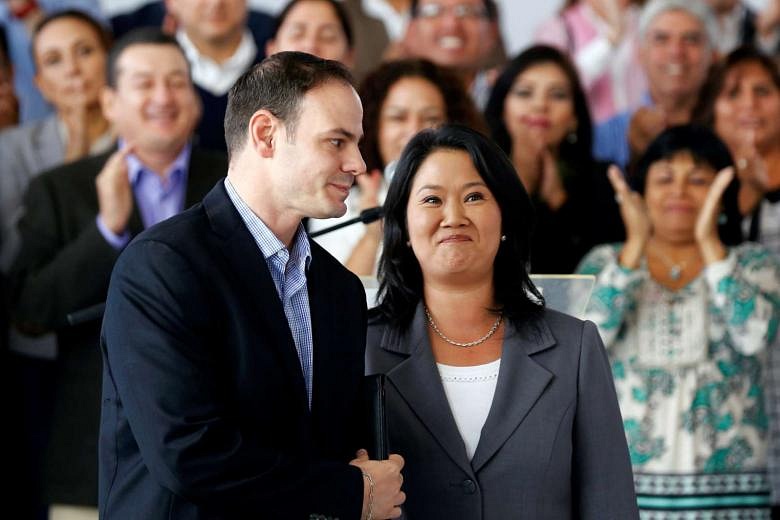LIMA (AFP) - Keiko Fujimori conceded defeat Friday in Peru's photo-finish presidential election to former Wall Street banker Pedro Pablo Kuczynski, who now faces the task of uniting a deeply divided country.
Fujimori, the daughter of disgraced and jailed former president Alberto Fujimori, had refused to give up for five days after the neck-and-neck run-off vote, holding out hope the count would swing back in her favour.
But with political analysts, statisticians and even some members of her own party saying it was impossible for her to win even by challenging smudged and otherwise questionable ballots in court, she finally threw in the towel.
"In a democratic spirit, we accept these results," she said, flanked by members of her Popular Force party, who will have a majority in Congress from late July.
Kuczynski, 77, has called for unity in a country left torn by the election, in which he took 50.12 per cent to Fujimori's 49.88 per cent.
"It's time to work together for the future of our country," he said on Thursday.
Kuczynski, a former economy minister who studied at Oxford and Princeton, now faces the challenge of assembling a consensus cabinet.
One of his first moves was to confirm his pick for economy minister, Alfredo Thorne, a former JP Morgan investment banker who managed his campaign.
For the rest of his team, he will have to seek balance across the political spectrum.
Kuczynski will have to extend an olive branch to Fujimori's party, which won 73 of the 180 seats in Congress in the first-round election in April.
His own party, Peruvians for Change, took just 18.
He will also have to repay the endorsement he received from the Peruvian left's leadership, which backed him in a run-off race between two right-leaning candidates.
Third-place candidate Veronika Mendoza of the leftist Broad Front party crucially threw her support to Kuczynski just before the second-round polls, urging Peruvians to vote against Fujimori because of her father's legacy.
Her party has 20 seats in the incoming Congress.
"We have to convince both Popular Force and those who are more to the left to support me," said Kuczynski.
The race opened old wounds dating back to the 1990s, when Fujimori's father Alberto was president.
Now serving a 25-year prison sentence for massacres by an army death squad, Alberto Fujimori (1990-2000) is fondly remembered by some Peruvians for his populist streak, his ruthless crack-down on the leftist rebel group Shining Path and his management of a strong economy.
But his authoritarian legacy was also heavy baggage for his daughter.
Analysts say Fujimori, 41, who was vying to become Peru's first woman president and led for most of the race, was damaged by a late surge of "anti-Fujimorismo."
The United States congratulated Kuczynski and "Peru's strong democratic values" almost as soon as Fujimori conceded.
Chile, Colombia and Spain had already sent their congratulations.
Peru, a nation of 31 million people, is one of Latin America's fastest-growing economies.
Famed for its ancient Inca cities high in the Andes mountains and its fusion-fuelled cuisine, symbolised by the refreshing raw fish dish ceviche, the country is a major exporter of gold, copper - and cocaine.
Economic growth slowed under outgoing leftist President Ollanta Humala, from 6.5 per cent when he took office in 2011 to 3.3 per cent last year.
Kuczynski, son of a Jewish doctor from Germany, has a long career in business and finance.
He is a cousin of Franco-Swiss filmmaker Jean-Luc Godard, and his American wife, Nancy, is a cousin of the Hollywood actress Jessica Lange.
The Fujimori family may be down but definitely isn't out of Peruvian politics.
One of the lawmakers flanking Fujimori Friday was her brother Kenji, 35, who has said he would stand for president in 2021 if his sister did not win in 2016.
The Peruvian vote reflected a broader shift to the right in Latin American politics.
A wave of leftist governments that governed across the continent over the past decade has weakened, with major setbacks in Argentina, Brazil and Venezuela.

